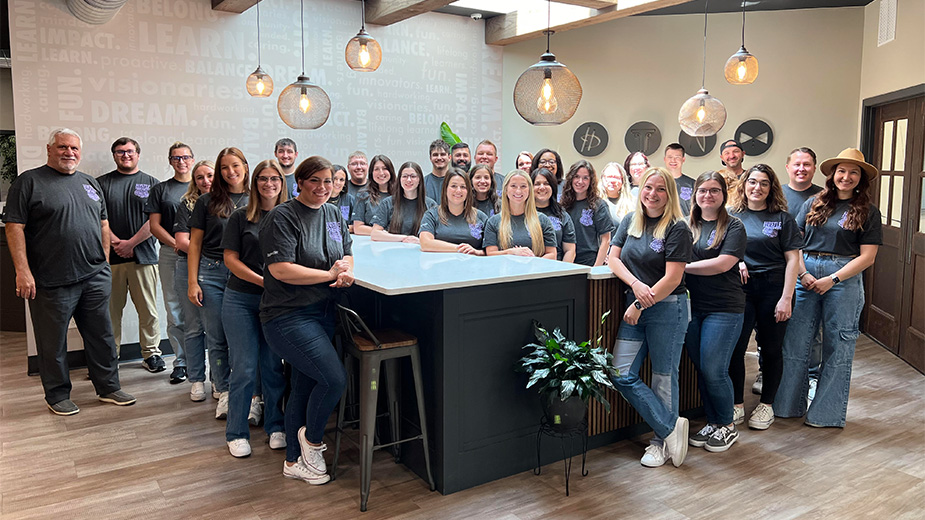E-Commerce Gives Small Businesses a Big Market
YOUNGSTOWN, Ohio — Four years ago when Emily Prine and Missy Louise started Pretty’s Bowtique, they didn’t expect the online business to lead to a bricks-and-mortar store. And they certainly didn’t expect to be shipping their products outside the United States.
But they are – to Canada, Spain, England and Russia.
That is where the boutique that specializes in hand-embroidered children’s clothes, maternity wear and other gifts finds itself today. On Nov. 4, Pretty’s Bowtique held its grand opening at 7684 Market St., Boardman, about four years after Prine and Louise started the company in a basement. At the time, they had two single-needle embroidery machines and sold their products on Etsy, a peer-to-peer e-commerce website that focuses on handmade and vintage items.
Today they operate seven commercial embroidery machines all day and employ two full-time and two part-time workers, Prine says. Pretty’s Bowtique is ranked among the top 1% of Etsy businesses and the company also started a Shopify site where it sells nonpersonalized products (Etsy requires some form of handmade personalization).
E-commerce helped Prine and Louise develop enough of a loyal following locally and repeat business that it was possible to start another business – they also own and operate Confetti House, a party and events rental space in the same building.
Some of their customers have bought clothes for their kids every year since the children were born, Prine says.
“I don’t know that we would have ventured into brick-and-mortar if we hadn’t had so much success online. We’re so grateful that our local customers wanted this as bad as we did.”
To drive traffic to its website, Pretty’s Bowtique advertises on Facebook along with some paid advertising though Etsy and Shopify. Both platforms have direct messaging, which goes directly to Prine and Louise’s cell phones so they can serve their customers.
Facebook is a proven benefit in engaging customers, Prine says. So is word-of-mouth. Their Facebook page has more than 68,000 followers, some of whom “are advertising for us” by taking pictures of their kids wearing clothes from the boutique and posting them on Facebook. During the grand opening, some used their phones to shoot video with Facebook Live.
“We couldn’t be more grateful for people like that,” Prine says. “This Valley is a close-knit place and we want to support each other.”
E-commerce is “definitely the answer to someone’s dream” when they lack the resources to open a physical location at the outset, says Derrick McDowell, founder of Youngstown Flea and We Are a Generation clothing brand.
When McDowell launched his brand of clothing, he created an iPhone app to market and sell his T-shirts. But he still worked to create physical experiences for his customers, including a launch party at an Austintown nightclub.
“They still wanted to know how the shirt felt,” he says. “As a new brand, I needed to find ways to create those interactions with customers.”
Those experiences are important because people want to know the stories behind the products and to engage with the brands, he says. Many of the vendors at Youngstown Flea have an e-commerce presence, but the market gives shoppers the chance to physically touch the products, which is important for local brands if they want to develop relationships with their customers.
One of those brands is Chisel Me Timbers in Canfield. Proprietor David Jones says e-commerce platforms make his products more widely available and easier to find, but in-person sales are stronger.
“People who come in and pick up something have an opportunity to become intimate with a piece,” Jones says. “My customers take the time to look at the wood. They see the details of the wood grain, the texture.”
While Jones has considered opening his own storefront, he says e-commerce has many benefits over traditional retail. With a storefront, retailers have a stationary site they hope people will find and walk in. “Hopefully the customers walking in like your stuff enough to walk out with it,” he says.
With e-commerce, retailers benefit from search engine optimization (SEO). Because customers seek specific products, retailers can increase the chances of customers finding their products by optimizing their website with commonly searched keywords.
Jones also relies on social media to drive traffic to his sites. He spends a few thousand dollars annually on Facebook advertising with a daily budget of $5 to $6. The investments have resulted in added sales, custom orders and about 8,400 Facebook followers.
“People are tracking me down, making requests and buying goods,” he says. “I have [social media] followers from all over the world, and many aren’t going to come to Youngstown to go to a brick-and-mortar store.”
Shipping costs can be a factor for small businesses, especially food vendors, which is why Danny Catullo helped to start Perishable Shipping Solutions, a direct-to-consumer perishable goods logistics and fulfillment company at 85 Karago Ave. in Boardman.
 Danny Catullo, CEO of Perishable Shipping Solutions, provides logistics and fulfillment services to more than 50 food companies throughout the United States.
Danny Catullo, CEO of Perishable Shipping Solutions, provides logistics and fulfillment services to more than 50 food companies throughout the United States.
In 2015, he started the company with four customers, and with the help of partners he now ships orders for 54 food companies throughout the United States, including Boardman’s Butter Maid Bakery.
Catullo started the company to increase his own e-commerce efforts. By aggregating shipping with other companies, all parties involved drive down their associated costs, including storage, packing materials and transportation.
A negotiated rate with FedEx helps keep costs down and lets Perishable Shipping Solutions ship two-day ground to 70% of the United States. Customers of Perishable Shipping can save anywhere from 10% to 50% on shipping costs.
“We have very large businesses that we work for,” Catullo says, “but we pride ourselves on helping small and emerging businesses grow.”
Partnerships with the Cleveland Culinary Launch & Kitchen, the Common Wealth Kitchen Incubator in Youngstown, the Union Kitchen in Washington, D.C., and the Prep commercial shared kitchen in Atlanta, as well as a few companies in New York positioned Perishable Shipping Solutions to help food startups sell their perishable goods online.
This comes when e-commerce makes it easier for food companies to sell their wares without having to secure shelf space in a grocery store. “People just want it to be easier to buy stuff without having to take their time in a store,” Catullo says. “We’re trying to provide the same quality and service, and we’ve been able to do that.”
Catullo estimates that 10,000 packages will be shipped in November and another 25,000 in December.
Perishable Shipping Solutions employs 10, and by mid-2018, he plans to open a second warehouse and logistics site on the West Coast. That, he says, should further lower his customers’ costs.
Shipments from his Catullo Prime Meats to customers throughout the country have increased “tenfold from where we started,” Catullo says, and e-commerce has resulted in more foot traffic in the shop. Orders placed on the shop’s website for in-store pickup have risen to anywhere from 20 to 50 orders weekly.
And with specials and recipes listed on the website, he says customers get the same quality service that his grandfather gave his customers, “But we’re doing it online too,” he adds.
Pictured at top: Emily Prine and Missy Louise opened a store after launching their Etsy-based company.
Copyright 2024 The Business Journal, Youngstown, Ohio.


